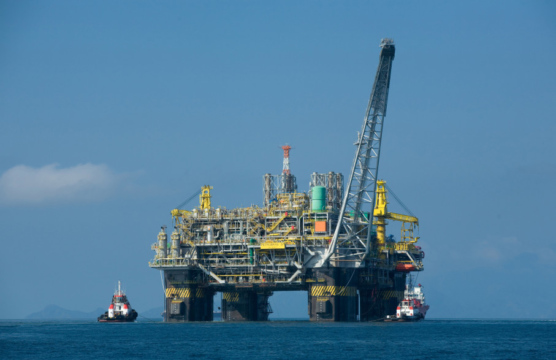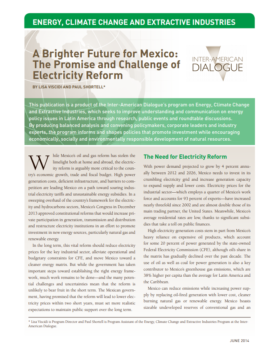
A Conversation on China-Brazil Energy Relations
Comparatively high rates of energy use in China and Brazil have led to investment in many forms of energy, including renewables.
A Publication of The Dialogue
I am pleased to share this selection of issues that the Energy Advisor's team felt covered especially important developments this year.
Edited by Gene Kuleta and Anastasia Chacón González, the Energy Advisor has produced more 50 editions over the past 12 tumultuous months for subscribers at many of the world's most innovative companies, including BMW, BP, Chevron, ExxonMobil, Equinor, Mitsui, and Rio Tinto, to name a few, as well as the libraries at Berkeley, Dartmouth, Harvard, Johns Hopkins and Notre Dame, among other leading universities, and government ministries on four continents.
We wish all of our readers happy holidays, as well as health and peace in the new year.
— Erik Brand, Publisher
Jul 3 | Energy Advisor
Oil majors including Shell and BP recently announced plans to write off as much as $22 billion and $17.5 billion worth of assets, respectively, after slashing their long-term price assumptions for oil and gas to reflect the effects of the Covid-19 pandemic. Additionally, BP said it expects the health crisis to accelerate the shift away from fossil fuels. Will the health crisis indeed speed up the energy transition—and if so, why and by how much? In what ways is the pandemic changing oil consumption patterns? Which Latin American countries will be most affected by such a shift, and what can they do now to prepare for the future?
Dec 18 | Energy Advisor
Among the energy policies that the Biden administration is expected to prioritize toward Latin America and the Caribbean are efforts to modernize and double the capacity of the Central American Electrical Interconnection system, as well as more collaborative approaches in the fight against climate change, according to Biden’s Central America plan. Is the United States likely to take a leading role on energy-related issues under the Biden administration? Are big changes in U.S. policy with regard to Latin America and the Caribbean expected in areas including oil and gas, renewables and climate change? Which countries have the most potential for increased cooperation with the United States on energy and environmental issues?
Oct 15 | Energy Advisor
Moody’s Investors Service last month lowered its ratings outlook on the North American Development Bank from stable to negative, citing the Mexican government’s proposed regulatory changes in the power sector, which it said would be “detrimental” to the renewable energy sector and the bank’s lending portfolio. What are the most important changes that the government of Mexican President Andrés Manuel López Obrador has introduced in the country’s power sector since taking office in December 2018? What effects have they had on the sector’s investment climate? Are more and similar changes expected in the period ahead, and how can companies prepare for them?
March 13 | Energy Advisor
The debate around the global energy transition away from fossil fuels has shifted from when it will happen to what it will look like, according to a report by S&P Global Platts released last month. Among the alternatives, hydrogen could achieve emission reductions in industrial settings, as well as in residential and commercial heating and long-haul trucking, the report said. In what ways is hydrogen being developed as a clean energy carrier globally and in Latin America and the Caribbean in particular? What are the advantages and disadvantages of a potential shift toward hydrogen-based fuel, and how does it compare to other clean energy alternatives, such as biofuel? How disruptive will the energy transition be for traditional fuel refining in the region, and how can refiners prepare for it?
Nov 20 | Energy Advisor
The administration of U.S. President Donald Trump declined to renew an exemption from sanctions for diesel supplied to Venezuela by non-U.S. companies, a measure that had been in place on humanitarian grounds. What was the motivation behind the Trump administration’s decision to block diesel-swap transactions involving Venezuela? To what extent and in what ways will the United States’ actions worsen the humanitarian crisis in the Andean nation? Will the move destabilize the government of socialist President Nicolás Maduro?
May 22 | Energy Advisor
Mexican state oil company Pemex this year seeks to nearly double drilling to 423 wells and speed up development of 15 recent discoveries, despite experts’ warnings that many are unprofitable at current international prices, Rigzone reported last month. It also plans to move ahead with a new refinery. Should Latin American states continue to invest money in an industry whose economic profitability has come into question both amid lower prices in the short term and in a context of climate policy in the longer term? Is it economically sensible for governments in the region to keep focusing on national oil companies, or should they redirect efforts toward other sectors? What are the underlying factors influencing governments’ decisions to continue supporting state oil firms, and how do resource nationalism and politics come into play?
May 15 | Energy Advisor
Brazil’s Petroleum, Natural Gas and Biofuels Agency, or ANP, contracted slightly more than one billion liters in the country’s latest biodiesel auction for deliveries in May and June, down 9.2 percent from the previous tender, F.O. Licht reported. The announcement comes as concerns arise over biofuel production in the South American country as demand plummets due to the coronavirus pandemic and low oil prices make the renewable fuel less competitive. How is the current international scenario—including dwindling demand for fuels and lower oil prices—affecting biofuel production in Brazil? How much have recent developments changed the outlook for the biofuel sector in the South American nation? What trends can the industry expect in the medium and long terms, and how can it prepare for them?
Oct 30 | Energy Advisor
The government of Argentine President Alberto Fernández has launched a plan aimed at boosting natural gas production in coming years, as the country faces potential shortages next year due to declining output amid the Covid-19 pandemic. What are the most important elements of the plan, and how effective will the incentives be in increasing natural gas production in Argentina? Are there reasons for concern over the country’s natural gas supply next year, and what can the government do now to avoid such problems? Will Argentina have to resort to increasing natural gas imports in the near future, and what implications would that have for consumers?
Nov 27 | Energy Advisor
Estimated resources at Guyana’s offshore Stabroek block are now nine billion barrels of oil equivalent (boe), up from more than eight billion boe forecast earlier this year, Hess Corp., one of the companies developing the block, said last month. What is the current state of oil production in Guyana, nearly a year after it began? How have low oil prices and increased uncertainty this year affected the South American nation’s prospects for oil development? Is the government of President Irfaan Ali, who took office in August, implementing the right policies to both attract investment and effectively manage oil revenue?
Aug 14 | Energy Advisor
Chile’s energy commission in July approved Enel Generación Chile’s plan to disconnect the second unit of the Bocamina coal-fired plant in May 2022, 18 years earlier than originally planned. The company is also set to take the first unit of the plant offline this year. Meanwhile, plans are underway for the construction of Chile’s first hybrid industrial plant, which will include both a solar power plant and a wind farm. How meaningful are these recent announcements in the context of Chile’s overall energy matrix and its goals to use more renewable energy sources? What is the status of Chile’s renewable sector today, and how has it changed over the past 10 years? To what extent has the global economic crisis affected progress in the country’s energy transition, and is Chile on track to become carbon-neutral by 2050, as it has pledged?
Nov 6 | Energy Advisor
As the aviation industry seeks to reduce its greenhouse gas emissions, the global sustainable aviation fuel (SAF) market is expected to grow sharply in the years ahead, according to a September blog post by S&P Global Platts. What fuels and technologies show the most promise to sustainably power aircraft transportation? Are countries in Latin America and the Caribbean in a position to capitalize on the market growth, and what regulations and incentives should governments in the region put in place in order to advance the SAF market? Has the financial pressure put on airlines due to the Covid-19 pandemic reduced their ability to upgrade fleets, and will this significantly delay the adoption of renewable fuels in the industry?
Dec 11 | Energy Advisor
Among the challenges facing new Bolivian President Luis Arce is a declining level of natural gas exports. The country’s gas exports to Brazil and Argentina are estimated to be about nine billion cubic meters this year, and they are expected to decline to a third of that level by 2025, according to a report by Rystad Energy. What are the reasons behind Bolivia’s falling gas exports, and what does the trend mean for the country’s economy? What actions should Arce’s government take in order to increase natural gas exports? Is Arce’s government expected to significantly change Bolivian energy policy?
Oct 2 | Energy Advisor
Enel X and global investment manager AMP Capital recently announced a partnership to develop infrastructure for the deployment of electric public transportation across the Americas. What is the state of electric mobility in the region today, and how strong is its outlook for growth? To what extent will health safety concerns and high government debt burdens curb investment in and use of public transit in the Americas? Are continued low fuel prices likely to make electric transportation a less attractive option?
 The Latin America Advisor features Q&A from leaders in politics, economics, and finance every business day. It is available to members of the Dialogue’s Corporate Program and others by subscription.
The Latin America Advisor features Q&A from leaders in politics, economics, and finance every business day. It is available to members of the Dialogue’s Corporate Program and others by subscription.
Comparatively high rates of energy use in China and Brazil have led to investment in many forms of energy, including renewables.
While Mexico’s oil and gas reform has stolen the limelight, the electricity reform is more critical to the country’s economic growth.
On March 7th, the Inter-American Dialogue and CAF-Development Bank of Latin America organized a roundtable with a diverse group of experts to provide input for a forthcoming report on US investment in Latin American energy.


